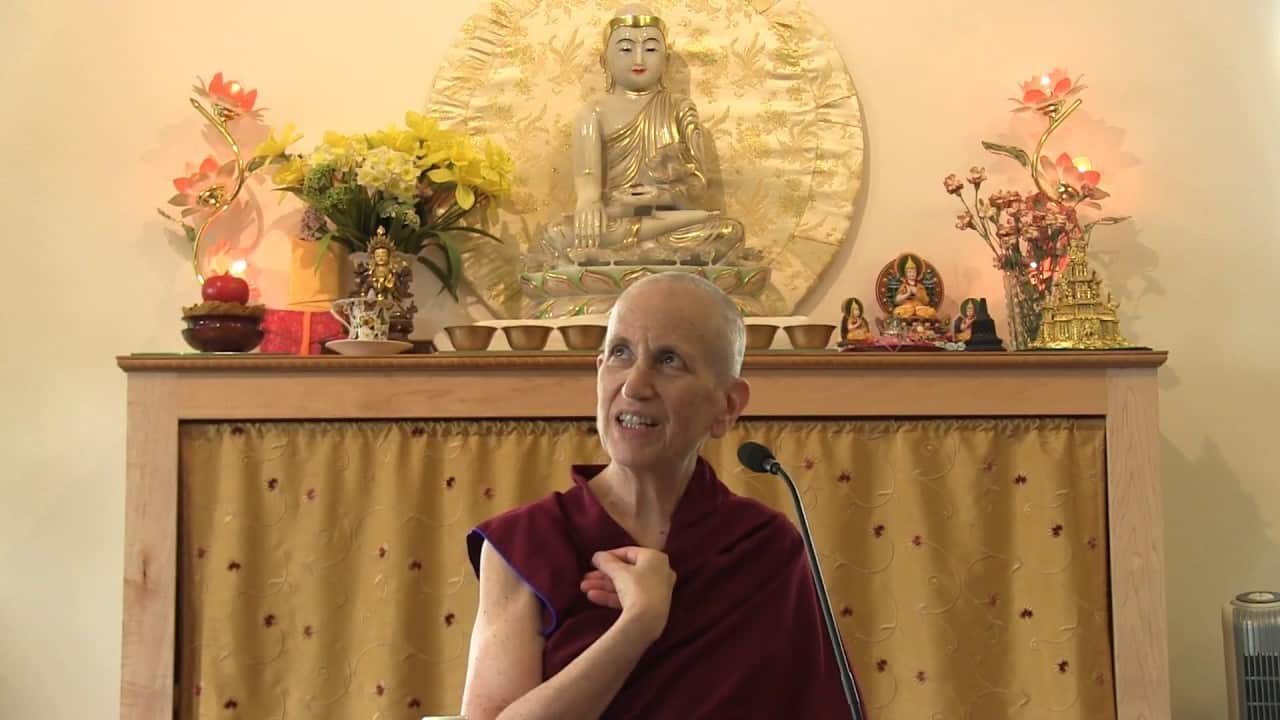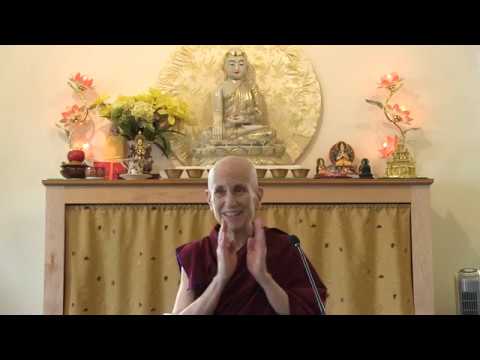Serve other beings as much as possible
Part of a series of short talks on the pithy verses from the end of Lama Yeshe's book When the Chocolate Runs Out.
- Serving others by practicing and preserving the Dharma
- Making the Dharma available to others
- Serving others in any way we are capable
Let’s continue with some of Lama’s phrases. The first sentence he said,
Share your love, your wisdom, and your wealth
and serve other beings as much as possible.
I explained the first part yesterday. Now we’re on the “and serve other beings as much as possible.”
That was something that Lama emphasized a lot. Remember Venerable Wuyin during the Vinaya course, she emphasized that a lot, too. Part of the sangha’s role is not just to keep our precepts, to study, to meditate, to just preserve the Dharma and pass it down to future generations, but also to serve sentient beings. Of course, one way to serve sentient beings is by learning the teachings and practicing them and passing them down, but she really emphasized, and Lama did too, just in our daily life behavior, our daily life conduct, to serve the people that we come in contact with and also, because Lama set up this whole network of centers, his whole idea was for centers to serve the public by making the Dharma available to all sorts of people who normally wouldn’t have come in contact with it, for example, most of us.
Most of us came in contact with the Dharma because somebody had the mind of serving sentient beings and put the information out there in some public way or another so that we came across it and we happened to encounter the Buddha’s precious teachings. And then having encountered them, we were able to go to centers or now monasteries or wherever and hear the teachings. That’s another way really of serving sentient beings and Lama really hammered that into us, again and again, and talking about the benefits of having places where people can meet the Dharma and the benefits of making the teachings available.
When I went to Singapore, when I lived there in ’87 and ’88, one thing that really warmed my heart was that they have a tradition in Southeast Asia of making Dharma books available for free distribution. So people would see it as a meritorious act, which it is, and donate funds, and then all sorts of short Dharma books, not usually the long ones but the short ones, would be printed for free distribution and then passed out at temples. I’ve talked to many people who have encountered the Dharma because they went to Phor Kark See Monastery in Singapore and they happened to pick up a little booklet, Working with Anger. They have ones from Theravada teachers and general Mahayana and Tibetan teachers, and they have things in Chinese and in English. It’s really very very nice and really serves the public.
I think the prison work we do is very much involved with serving sentient beings, because talk about a group of people who would never have the opportunity to meet the Dharma and who need it so much. Making the Dharma available to them is really quite wonderful.
Some of you heard my little story how Lama hammered this into me in particular about serving sentient beings because each year at Kopan he and Rinpoche would teach a course and then there would be one western student who would lead the meditations and so on. I received word one time that I was, and I was a baby nun, had just been ordained, I was going to be the Western assistant for the next course, and I just froze and I thought, “I’m a baby nun, what can I do?” So I went to see Rinpoche. I had an appointment with him and he said, “Oh you go ask Lama”. So I went to ask. I said “Lama, you know, I can’t do this, I don’t know anything” and that’s when he looked at me, and Lama, when he went like this (makes a stern face), you stood up straight, and he said, “You’re selfish”. So there you have it, your teacher called you out and this was his message that whatever you do know, whatever you can give, whatever you’re capable of doing, you do that. Don’t just sit there saying “I can’t” when there are sentient beings who need your help. So it could be in terms of sharing the Dharma. It could be in terms of sharing your skills to do one thing or another, but very much this idea of serving sentient beings.
I read recently about a woman who had just gotten a new battery on her 360-pound electric wheelchair, and the new battery just went “psst”, and her wheelchair stopped suddenly and she fell off. She was right by a church and a shopping center. The only person who stopped to help her was one person who helped her get back in the chair after she had fallen out. Then she was sitting there by the roadside not knowing what to do because the chair wasn’t moving. This one kid came along, an African American kid, and said kind of “What’s happening?” and got the story and said “Well, I’ll wheel you all the way home” and she was a little bit like, “Well he might wheel halfway and then he’ll get tired and then I’ll be really stuck.” But she said he seemed sincere. It was a half an hour walk and the wheels on the wheelchair were stuck, but he pushed her anyway, 360 pounds plus her and pushed her home. And then just kind of left, made sure she was okay and left. One of his friends had seen him do that and recorded him and made a video of it and put it on Facebook or one of those things. Anyway a lot of people saw. He didn’t know her. She didn’t know him, but friends who saw the video knew her and connected it, her with him, and then she took him to church. The people in the church gave him a plaque and really praised him for serving sentient beings, just helping a person who’s in front of your nose with what they need help with. We can do it in big ways, we can do it in small ways, but the idea is to have our eyes open to the experience of others and do what we can to be of service.
Venerable Thubten Chodron
Venerable Chodron emphasizes the practical application of Buddha’s teachings in our daily lives and is especially skilled at explaining them in ways easily understood and practiced by Westerners. She is well known for her warm, humorous, and lucid teachings. She was ordained as a Buddhist nun in 1977 by Kyabje Ling Rinpoche in Dharamsala, India, and in 1986 she received bhikshuni (full) ordination in Taiwan. Read her full bio.


